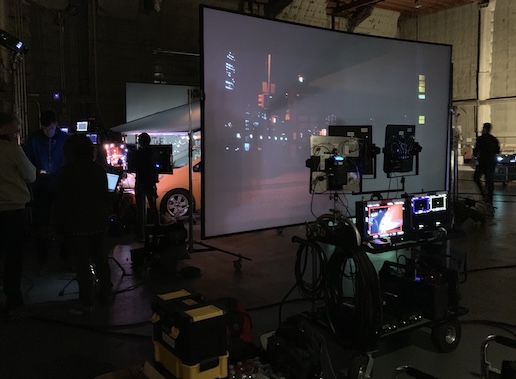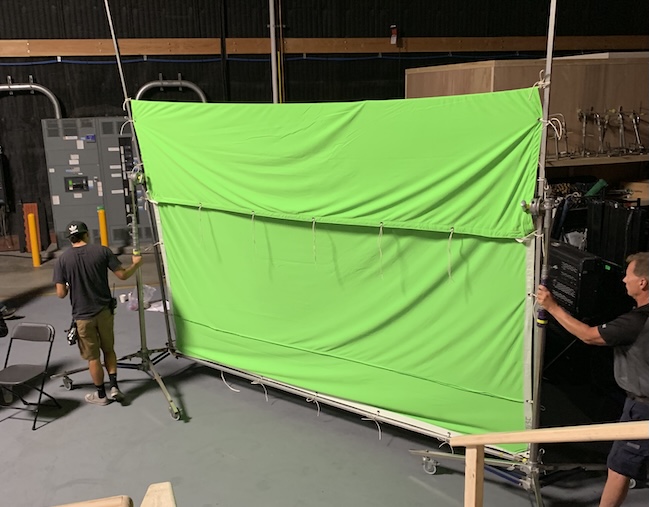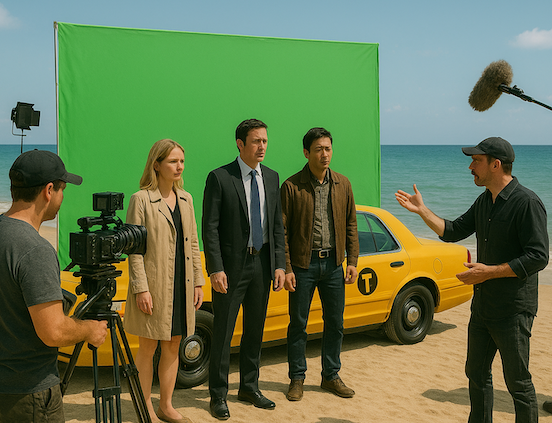Is Thailand the New Hollywood?
By Romen Basu Borsellino | 14 Aug, 2025
The Thai government’s latest tax incentives are driving waves of film and tv production to Southeast East.
This past Spring, an actor friend invited me to join him in Bangkok where he was shooting a film. Having never been, I leapt at the opportunity.
I got to work on the travel logistics — flight, hotel, exchange rate, local beer selection — without even stopping to ask about the nature of the film that this trip was based around. I knew only that it was a thriller.

Eventually, I made the 20+ hour journey from LAX to BKK with a 5am layover in Taiwan. When I arrived, I was greeted by a mix of local Thai crew members from the film and an American who had arrived a couple weeks earlier.
After I got to the hotel, showered, napped, and unpacked, I met my actor friend for the first of many delicious meals in a city that neither of us had ever been to. And now that all of the pressing logistics were out of the way, I could finally ask “So what’s this movie about, anyway?”
He gave me the broad strokes of the plot, his character, and a rundown of some of the film’s other actors who would be arriving from their respective cities that same day.
“That sounds great,” I responded. “And the whole film takes place in Bangkok?”
“No, none of it, actually,” my friend replied matter-of-factly. “The entire film is set in New York.”
I now had an additional question: “Then why the hell are we in Thailand?”
Hollywood Magic

Anyone who’s decently familiar with entertainment knows that the concept of “Hollywood magic” describes, among other things, the industry’s penchant for playing one city as another.
Regardless of where a show or movie is meant to take place, shooting in LA generally makes sense: It’s an entire city made up of film-making infrastructure from the specialized labor to the soundstages that can be transformed into elaborate sets to the warehouses of costumes, props, and camera equipment.
In recent years, other major cities have taken note of the financial boon that comes from film production and tried getting in on the action. Georgia, for example, has been steadily building its infrastructure.
Entertainment mogul Tyler Perry built his state of the art studio in Atlanta and Chik-Fil-A CEO Dan Cathy co-owns a studio in nearby Fayetteville that’s become a hotspot for shooting some of Marvel Entertainment’s biggest superhero franchises. Cathy’s Trilith Studios has housed productions including Black Panther, Spiderman, and Avengers: Infinity War.
But unless the film is about, say, peaches and pecans, what would drive a producer to shoot in Georgia over the more tried and tested LA?
The answer, of course, is money.
Georgia and other cities are known for tax incentives and lax labor laws, both of which are compelling enough for filmmakers to step out of their comfort zone and travel hours to a place that they’re likely less familiar with when it comes to production.
Now imagine being willing to travel to a foreign country over three times the distance from Atlanta.
You know the incentives have got to be good.
A Good Incentive
Last year, Thailand’s government implemented a major tax incentive for productions willing to film there: The previous cash rebate of up to 20% was increased to a maximum possible rebate of 30%.
Per Deadline, the new policy is “a 30% rebate on foreign shoots in the country with no cap. Previously, Thailand offered a cash rebate of 15%, with a further 5% available based on a cultural test. The maximum rebate per production was capped at 75 million baht ($2.1M).”
According to Thailand Business News, here’s a greater breakdown of these incentives:
- Base rebate: 15% for productions spending at least 50 million baht (~$1.4 million USD) locally.
- Maximum rebate: Up to 30% with additional criteria met, such as:
- +5% for promoting Thai tourism, soft power, or a positive image of Thailand.
- +5% for hiring Thai nationals in key production roles.
- +3% for filming in designated secondary or emerging locations (at least 25% of filming days).
- +3% for spending at least 15% of eligible costs on post-production in Thailand.
- +5% for budgets exceeding 150 million baht (~$4.3 million USD).
In short, the government of Thailand made the calculation that the money infused into their economy as a result of production will outweigh the 30% that they’re not collecting in taxes.
Thailand is certainly not the only Asian country to offer an incentive like this. But theirs is generally considered the best.
South Korea, Taiwan and Malaysia, for example, all offer up to 30% tax rebates. But unlike Thailand, their system can be confusing and difficult to navigate.
Some of the other countries, for example, may require permits that can be tough to get and require coordinating with numerous different offices. But in Thailand, all permits — like street closures— are handled by a single Thailand Film Office.
Singapore offers up to 50% but requires that the films portray the country in a positive light. Japan offered a similar amount but has a high budget minimum that many smaller or even mid-sized projects can’t meet.
In addition to Thailand’s reputation for being easy to navigate, they are also known to have readily-available equipment and plenty of local crew members who speak English. The same cannot be said for some of the other countries.
It’s clear why a country like Thailand would benefit from programs like this.
But the question is: Is it worth it for American productions.
Cost-Benefit

Let’s start with the obvious drawbacks:
Despite how easy the Thai government attempts to make the entire process, filming in Asia could pose a logistical challenge for any US production, like coordinating travel documents for everyone but the non-local crew.
And at some point, flying enough people and equipment in may simply offset the savings.
Even working with a local crew that speaks English could still prove a challenge. Certain phrases used on American sets have practically become a language of their own.
For example, a director that shouts “Martini take” is telling their crew that it’s the last shot of the day. That may be confusing enough for a Hollywood-local, let alone a Thai crew.
And actors can, of course, be known for having big egos. Some may simply be unwilling to trade in the fancy trailer they’d expect in Hollywood for a more modest “cooling tent” in Thailand.
Not to mention changes in climate that could affect filming. Jules O’Loughlin, the cinematographer for Marvel’s Disney+ series “Ms. Marvel” described the weather-related setbacks that the production faced while filming in Thailand during monsoon season:
“It was the biggest storm I think I've ever been in, and it almost washed our set out of the way. And it closed us down for about five hours.”
A friend who works in production once told me about a one-day shoot he had scheduled in an Indian village. A few hours in, the town lost power entirely and it took four hours to bring a new generator in, which almost derailed the entire production.
But despite all of these challenges, the cost of everyday life in Thailand is substantially cheaper than most US cities like LA, New York, and Georgia. Plus the ability to pay cheaper wages for local crews.
A number of US productions are deeming the hassle of filming in Asia to be worth it.
Looking Ahead
While Thailand’s latest incentives only went into effect this year, there already appears to be an increase in filming there.
Just this week, FX’s new sci-fi series “Alien: Earth” premiered after a nearly two-year shoot in Thailand.
The series, which shot all across the country in the provinces of Bangkok, Phang Nga, Krabi, Nakhon Pathom, Surat Thani, Prachuap Khiri Khan, and Samut Prakan, is Thailand’s largest foreign production in 30 years. The show has an $86 million budget and has employed approximately 16,000 Thai crew members during its two years in country.
Per the New York Times, “The show was drawn to Thailand by the up-do-date facilities and skilled work force, and by proximity to dramatic coastal and mountain locations.”
Alien is meant to take place in a humid futuristic version of Earth, so shooting in the intense Thai heat was “both a challenge and a feature.”
Some have speculated that Thailand’s increased incentives were a direct result of HBO’s decision to shoot White Lotus Season 3 there. The latest edition of the hit anthology series, which is actually meant to take place in Thailand, premiered in February after shooting in the Thai cities of Bangkok, Phuket, and Ko Samui the previous year.
Other recent productions filmed in Thailand include “Extraction,” Apple TV’s “Shantaraman,” and “The Meg 2.”
And if the trend keeps up, we might have to change the phrase to “Bangkok magic.”
But despite all of these challenges, the cost of everyday life in Thailand is substantially cheaper than most US cities like LA, New York, and Georgia. Plus the ability to pay cheaper wages for local crews. A number of US productions are deeming the hassle of filming in Asia to be worth it.

Articles
Asian American Success Stories
- The 130 Most Inspiring Asian Americans of All Time
- 12 Most Brilliant Asian Americans
- Greatest Asian American War Heroes
- Asian American Digital Pioneers
- New Asian American Imagemakers
- Asian American Innovators
- The 20 Most Inspiring Asian Sports Stars
- 5 Most Daring Asian Americans
- Surprising Superstars
- TV’s Hottest Asians
- 100 Greatest Asian American Entrepreneurs
- Asian American Wonder Women
- Greatest Asian American Rags-to-Riches Stories
- Notable Asian American Professionals

